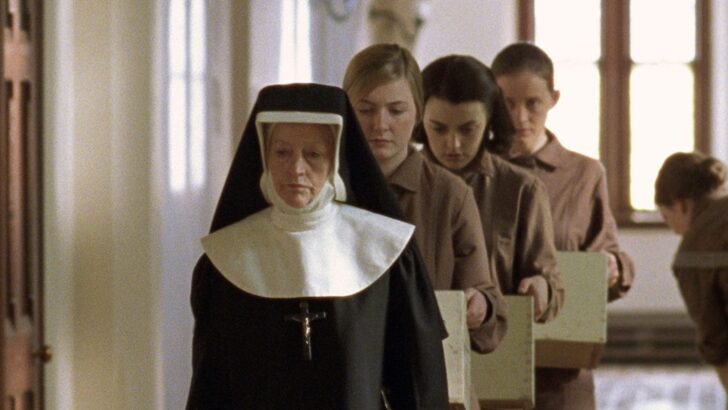The renowned American author Henry James gave advice to anyone seeking to write a novel or a play. There are three rules, he said: “Dramatise, dramatise, dramatise!”
That is, make everything in fiction more extreme than in real life. Make the baddies badder and the goodies more heroic. Exaggerate every aspect of story and action. Portray everything larger than life. Drive home your narrative with melodrama.
Modern screenwriters take this to heart, and few more sincerely than those who write about any aspect of historic Catholic Ireland. Nuns are malevolent fiends and priests cruel villains. In the current BBC TV drama The Woman in the Wall, The Daily Telegraph gloatingly reported that Irish nuns and priests spent their time “all but ripping babies from wombs and taking them to an uncertain fate”.
The six-part drama, written by Joe Murtagh, excels itself by adding in every other stage-Irish cliché too: dopey, half-witted Gardaí too idle to investigate crime, a sweary native cast whose every second utterance is the f-word, a belief in banshees (in 2015), plus ubiquitous statues and holy pictures symbolising hypocrisy and oppression. And of course alcohol.
Even The Irish Times called it “baroque and hysterically over-cooked”. (In short, the London media lapped it up; not so much admiration was expressed in Ireland.)
However, this melodrama does get one aspect of the Magdalene story right – an aspect that is often ignored in movies like Philomena. This production shows that the woman portrayed, Lorna, was consigned to the Magdalene institution by her own family. And that is a part of the record that is seldom highlighted or explained. Most pregnant girls who went into institutions were committed by their parents.
Even a scholarly study, such as A Dublin Magdalene Laundry by Mark Coen et al, (published this year by Bloomsbury Academic) scarcely mentions this point.
Yet a pamphlet written by a journalist, Gertrude Gaffney, in 1937 called Emigration to England (available in the National Library) paints a vivid picture of naive young Irish girls, easily tempted by seduction, or even prostitution, and then rejected by their parents if a pregnancy occurs. The Catholic agencies “do their best” to help, reported Gaffney, but families won’t take the daughters back with a baby.
The Magdalene story is a very sad one, but also a complex one, with many different interwoven threads, including mental health issues, and criminal justice problems. Some troubled young girls were committed for infanticide, which might have been seen as a lesser punishment than prison.
It’s regrettable that nuns who were part of the Magdalene system have not given their witness, spoken of their experience or written a memoir. Yet even the victims of the system quoted in the Coen et al book suggest that some nuns tried to be kind. Perhaps nuns themselves were too squashed into a rule of silence.
But until that silence is broken, sisters will continue to be portrayed as the vicious villains of contemporary screen dramas.
***
A lady takes her leave
“We know not the day nor the hour”, is a truth we should ever have before us. On Tuesday, August 22, Chryss Goulandris – also known as Lady O’Reilly, since her marriage to Tony O’Reilly, legendary Irish rugby star and business magnate – was enjoying a lunch with an old friend, Edouard de Rothschild, at Deauville. The next day, she died unexpectedly, aged 73.
Chryss was a graceful person, from a Greek shipping family, although born in New York. She married Tony O’Reilly, as his second wife, when she was in her 40s, and became the chatelaine of his Co. Kildare mansion, Castlemartin.
She was a pleasant, sometimes quite shy, hostess at the dinner parties where Tony would shine with his brilliant conversation and witty mimicry. Sometimes the conversation would turn to the minutiae of Irish politics – what Garret Fitzgerald once said to Conor Cruise O’Brien – and Chryss would listen politely and patiently, although I suspect this must have been quite boring for her. How interested would we be in the details of Greek politics?
With her brother Peter she valiantly supported Tony O’Reilly’s endeavours to rescue Waterford Glass, and together they poured €400 million to save a great Irish institution and the jobs of many skilled workers. But its time was past – crystal glass was no longer offered for wedding gifts – and it couldn’t survive, alas.
Chryss had no children but was deeply attached to her horses, and was a successful horse-breeder. On one occasion at Castlemartin, she was upset because one of her colts had died. “Never mind – she has plenty more,” Tony said rather heartlessly. He wanted her jockeys to race in the colours of his old school, Belvedere.
Chryss thought the diagonal stripes of the Belvedere shield made the riders “look like convicts”. Her husband, now 87 and twice widowed, will greatly miss her.


 Mary Kenny
Mary Kenny A nun and her charges are depicted in a scene from the movie 'The Magdalene Sisters', a docudrama on incidents that took place at Magdalene laundries. A new BBC drama has put the spotlight back on the laundries, with a mixed response from critics in Ireland.
A nun and her charges are depicted in a scene from the movie 'The Magdalene Sisters', a docudrama on incidents that took place at Magdalene laundries. A new BBC drama has put the spotlight back on the laundries, with a mixed response from critics in Ireland. 
